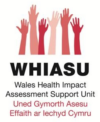The European Centre for Health Policy (1999) Gothenburg Consensus is widely accepted as the seminal definition of Health Impact Assessment and defines it as:
‘A combination of procedures, methods and tools by which a policy, programme or project may be judged as to its potential effects on the health of a population, and the distribution of those effects within the population’.
However, alternative definitions have recently been proposed (Elliott et al. 2010) as the practice of HIA has evolved:
‘…a process through which evidence (of different kinds), interests, values and meanings are brought into dialogue between relevant stakeholders (politicians, professionals and citizens) in order imaginatively to understand and anticipate the effects of change on health and health inequalities in a given population’.
HIA provides a systematic yet flexible and practical framework that can be used to consider the wider effects of local and national policies or initiatives and how they, in turn, may affect people’s health. HIA works best when it involves people and organisations who can contribute different kinds of relevant knowledge and insight. The information is then used to build in measures to maximise opportunities for health and to minimise any risks. It also provides a way of addressing the inequalities in health that continue to persist in Wales.
There are three main types of HIA:
- Prospective HIA – at the start of the development of a project, proposal or plan.
- Concurrent HIA – runs alongside the implementation of the project (or policy).
- Retrospective HIA – assesses the effect of an existing project or policy and can be used as an evaluation tool. Retrospective assessments can also be made of unexpected events, as a way of learning lessons for future similar events.
Within any of the above, HIA can take one of three different forms, depending on the focus and the time and resources available:
- A Desktop HIA exercise can take hours or a day and can encompass a small number of participants around a table using existing knowledge and evidence to assess a proposal, policy or plan.
- A Rapid HIA can take days or weeks and usually includes the establishment of a small steering group and often uses the approach of a participatory stakeholder workshop – it typically involves a brief investigation of health impacts, including a short literature review of quantitative and qualitative evidence and the gathering of knowledge and further evidence from a number of local stakeholders.
- Comprehensive HIAs are more in-depth and can take months to complete. They may be time intensive, financially costly, require extensive literature searches and the collection of primary data. This type of HIA is more suited to more complex proposals.
For more information please read ‘HIA: A practical guide’
Sources:
Elliott E, Harrop E, and Williams GH (2010) Contesting the science: public health knowledge and action in controversial land-use developments, in P. Bennett, K Calman, S Curtis and D Fischbacher-Smith (eds) Risk Communication and Public Health (second edition), Oxford: Oxford University Press.
European Centre for Health Policy (1999) Health Impact Assessment: Main concepts and suggested approach (Gothenburg Consensus), Brussels: European Centre for Health Policy.
